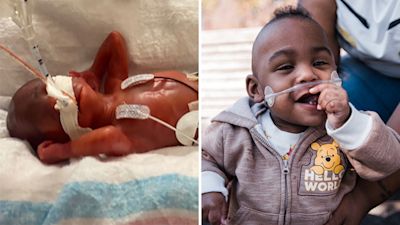World's most premature baby defies 'less than 1%' survival odds to make it home

A baby boy who was born halfway into a 40-week pregnancy has become the world's most premature baby to survive.
Curtis Means was born in the University of Alabama at Birmingham's hospital in the US weighing no more than a football at 420g, alongside his twin sister C’Asya.
The twins, who were born 21 weeks into pregnancy on July 5 last year, were so premature doctors put their chances of survival at less than 1%.
The hospital said it usually offers compassionate care in such situations, allowing parents to hold their babies and cherish what little time they may have together.
C'Asya died a day later, but Curtis astounded doctors as he clung on in intensive care.
Therapists had to help him learn to eat and breathe and he was taken off a ventilator after three months.
In April this year, after 275 days in hospital, Curtis was healthy enough to be discharged and made it home with his mum and siblings.
Mum Michelle Butler said: “Being able to finally take Curtis home and surprise my older children with their younger brother is a moment I will always remember.
"It was a difficult journey, but I am grateful for the University of Alabama at Birmingham team and their constant support.
"They took the time to educate me and made sure I knew what was happening every step of the way. They truly cared about my son and me.”
Doctor Colm Travers said: “Curtis defied all scientific odds
"Gestational age and birth weight are two key predictors of a premature baby’s survival, and other factors include if the baby is a female, a single birth and if the mother was administered steroids that help with lung development before birth.
"Curtis did not meet any of these criteria.”
Curtis, who is now more than a year old, is now a Guinness World Record holder for the world's most premature baby to survive.
Doctor Brian Sims, who had described Curtis' chances of survival as "little to no chances", said: "We do not know what all the future will hold for Curtis since there is no one else like him. He started writing his own story the day he was born.
"That story will be read and studied by many and, hopefully, will help improve care of premature infants around the world.”